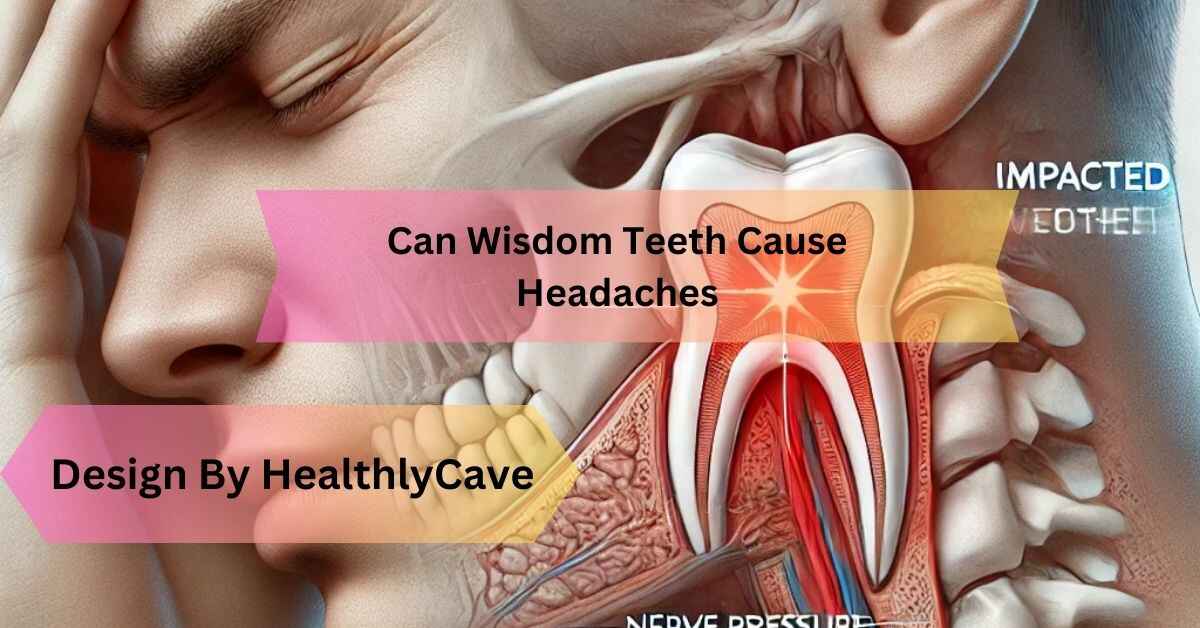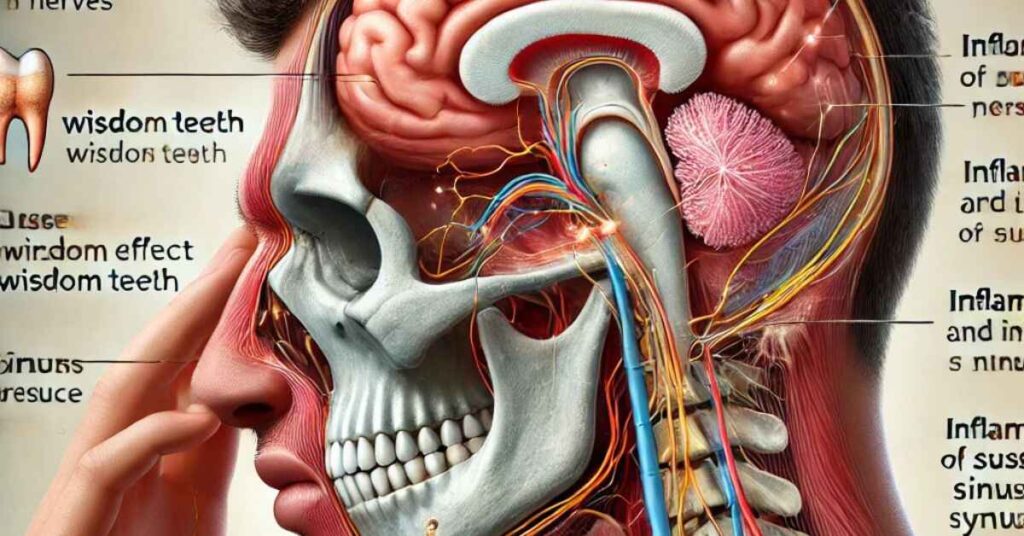
05 Feb Can Wisdom Teeth Cause Headaches – Signs, Causes & Solutions!
Wisdom teeth, also known as third molars, are the last set of teeth to develop. While some people have no issues with them, others experience pain and discomfort. One common concern is whether wisdom teeth can cause headaches. If you’ve been dealing with persistent headaches along with jaw pain, swelling, or difficulty chewing, your wisdom teeth might be the culprit. In this article, we will explore the connection between wisdom teeth and headaches, symptoms to watch for, and possible treatment options.
How Can Wisdom Teeth Cause Headaches?

Wisdom teeth can cause headaches due to several factors, including:
Impaction:
When wisdom teeth do not have enough space to emerge properly, they may become impacted, causing pressure on the jaw and nearby nerves, which can lead to headaches. This can also result in cyst formation, further worsening the pain and discomfort. In severe cases, impaction can lead to nerve damage, causing numbness or tingling in the jaw. Removing impacted teeth early can prevent complications and reduce long-term pain.
Jaw Tension:
The growth of wisdom teeth can cause misalignment in the jaw, leading to muscle strain and tension headaches. This tension can extend to other areas of the face and neck, causing chronic pain and discomfort. Over time, misalignment can also contribute to temporomandibular joint (TMJ) disorders, making jaw movement painful. Regular dental check-ups can help identify early signs of misalignment and prevent worsening symptoms.
Inflammation and Infection:
Partially erupted wisdom teeth can trap food and bacteria, leading to infections and swelling, which may trigger headaches. If left untreated, infections can spread to other parts of the mouth and cause more severe health problems, including gum disease and abscess formation. In extreme cases, the infection can reach the bloodstream, leading to serious systemic complications. Practicing good oral hygiene and seeking professional dental care can help prevent infections.
Teeth Grinding (Bruxism):
Some people unconsciously grind their teeth due to wisdom tooth pain, leading to tension headaches and discomfort. Grinding can also wear down tooth enamel, leading to increased sensitivity, jaw pain, and even fractures in other teeth. Chronic grinding may also contribute to
TMJ disorders, causing difficulty in chewing and opening the mouth. A dentist may recommend a nightguard to protect the teeth and reduce strain on the jaw.
Sinus Pressure:
In some cases, upper wisdom teeth grow close to the sinuses, causing pressure and sinus headaches. This can lead to nasal congestion and facial pain, making it difficult to differentiate between sinus-related and wisdom teeth-related headaches. The pressure can also cause dizziness and difficulty breathing through the nose. If sinus-related symptoms persist, a dentist may recommend extraction to relieve the pressure
Symptoms of Wisdom Teeth-Related Headaches:
If your wisdom teeth are causing headaches, you may also experience:
- Pain in the back of the mouth or jaw
- Swelling and tenderness in the gums
- Difficulty opening your mouth fully
- Ear pain or pressure
- Stiffness in the neck or jaw
- Persistent bad breath or an unpleasant taste in the mouth
- Difficulty in chewing or biting
- Facial swelling or tenderness
- Throbbing pain that spreads from the jaw to the temples
- Increased sensitivity in adjacent teeth due to crowding
READ MORE: No Headache Visor – Comfort and Style for All-Day Wear!
Treatment Options for Wisdom Teeth Headaches
If you suspect your wisdom teeth are causing headaches, consider the following solutions:
Pain Relief Medications:
Over-the-counter pain relievers like ibuprofen can help reduce inflammation and discomfort. However, prolonged use of painkillers without addressing the root cause is not recommended. Acetaminophen can also be used for pain relief, especially for those who cannot take NSAIDs. Consulting a dentist before relying on medication is essential to avoid masking an underlying issue.
Warm Compress or Ice Pack:
Applying heat or cold to the jaw can ease tension and reduce swelling. A warm compress can help relax tight muscles, while an ice pack can numb the pain and reduce inflammation. Alternating between hot and cold treatments can provide better relief for persistent pain. Using a clean cloth or towel between the compress and skin can prevent burns or frostbite.
Good Oral Hygiene:
Keeping your mouth clean can help prevent infections and reduce irritation from wisdom teeth. Regular brushing, flossing, and using an antiseptic mouthwash can keep bacteria at bay. Avoiding tobacco and alcohol can also reduce the risk of gum inflammation. A soft-bristled toothbrush can help clean around sensitive areas without causing further irritation.
Saltwater Rinse:
Gargling with warm salt water can help reduce inflammation and prevent infections in the affected area. This is an effective home remedy to soothe gum irritation. Repeating the rinse several times a day can promote healing and reduce bacteria buildup. Adding a pinch of baking soda to the saltwater solution can further enhance its antibacterial properties.
Dietary Adjustments:
Avoiding hard or chewy foods can minimize stress on the jaw and reduce discomfort while chewing. Soft foods like smoothies, yogurt, and soups can help alleviate pain while allowing the mouth to heal. Staying hydrated and avoiding overly hot or spicy foods can prevent further irritation. Eating on the opposite side of the mouth can also reduce pressure on the affected area.
Dental Evaluation:
A dentist can take X-rays to determine if wisdom teeth are impacted and need removal. Regular dental check-ups can help catch problems early before they worsen. Discussing any symptoms with your dentist can help create a personalized treatment plan. In some cases, antibiotics may be prescribed if there are signs of infection.
Wisdom Teeth Extraction:
If the pain is persistent or causing complications, removing the wisdom teeth may be the best solution. Extraction is a common and safe procedure that can provide long-term relief. Following post-surgery care instructions, such as avoiding straws and strenuous activities, is crucial for proper healing. Recovery typically takes a few days, and pain management strategies can make the healing process smoother.
When to See a Dentist?
You should consult a dentist if:
- Headaches become frequent or severe
- You experience persistent jaw pain
- There is noticeable swelling or infection
- It becomes difficult to chew or speak
- You have difficulty opening your mouth fully
- You notice pus or excessive bleeding around your wisdom teeth
- The pain spreads to your ear, neck, or throat
- Your headaches do not improve with pain relief methods
Recovery After Wisdom Teeth Extraction:
If you undergo wisdom teeth removal, proper aftercare is essential for smooth healing. Here are some tips for recovery:
- Rest for at least 24-48 hours after the procedure.
- Apply ice packs to reduce swelling.
- Stick to soft foods like yogurt, soup, and mashed potatoes.
- Avoid using straws, as sucking motions can dislodge blood clots and delay healing.
- Keep your mouth clean by gently rinsing with salt water.
- Avoid smoking or drinking alcohol during the recovery period.
- Follow your dentist’s post-operative care instructions to prevent complications.
- Take prescribed medications as directed to manage pain and prevent infections.
FAQs:
1. Can wisdom teeth cause migraines?
Yes, impacted wisdom teeth can contribute to migraines due to jaw tension, nerve compression, and inflammation in the surrounding tissues.
2. Will my headaches go away after wisdom teeth removal?
In most cases, headaches caused by wisdom teeth improve after extraction. However, recovery time varies depending on the individual and the severity of the impaction.
3. How long does it take for wisdom teeth pain to go away?
Mild pain from wisdom teeth eruption can last a few days, while post-extraction pain may take up to two weeks to fully subside.
4. What happens if I don’t remove my wisdom teeth?
If wisdom teeth remain impacted or cause discomfort, they can lead to infections, damage to adjacent teeth, jaw misalignment, and chronic headaches.
5. How can I tell if my headache is from wisdom teeth?
If your headaches are accompanied by jaw pain, gum swelling, ear discomfort, or difficulty opening your mouth, your wisdom teeth may be the cause. Consulting a dentist can help confirm the diagnosis.
Conclusion:
Wisdom teeth can indeed cause headaches, especially if they are impacted, misaligned, or infected. The pain and discomfort can spread to different parts of the face, neck, and head, making it essential to seek treatment if symptoms persist. If you’re experiencing symptoms, it’s best to see a dentist for proper diagnosis and treatment. Early intervention can prevent further complications and relieve discomfort effectively. By maintaining good oral hygiene and seeking professional dental care, you can ensure a healthier, pain-free mouth.

No Comments